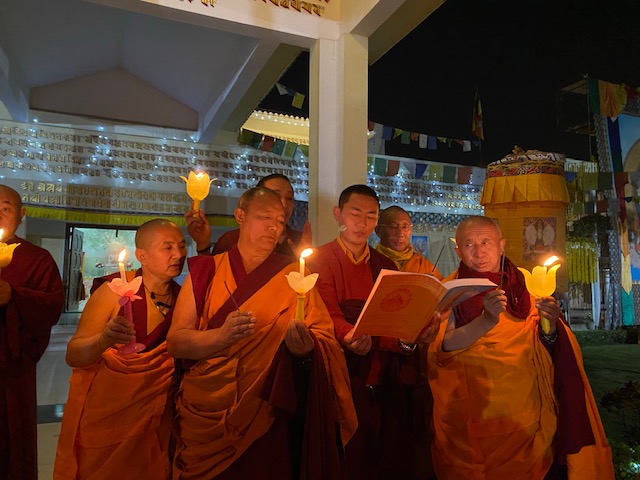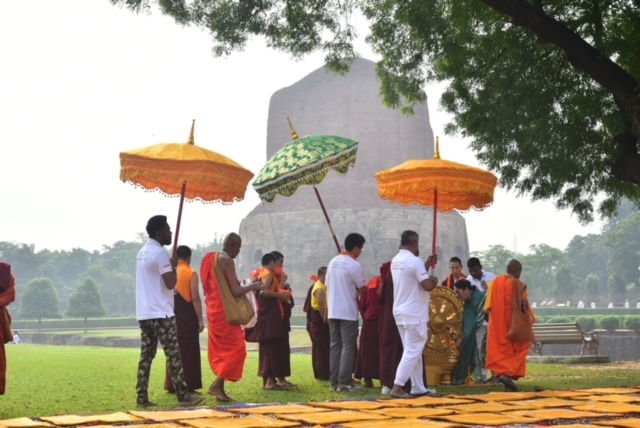Manjushri Namasanghiti
Global Chanting Program

The International Manjushri Namasanghiti Chanting Program was established in 2015 by Tarthang Tulku to support the revitalization of the recitation of this most sacred Sanskrit Buddhist text. Rinpoche’s vision is to help restore this sacred text and spread its sublime blessings throughout India and the world.
History and Dedication from Tarthang Tulku:
The Manjushri Namasangiti is a profoundly important and sacred text for both Sutrayana and Mantrayana studies. The entire ground, path, and fruition of the Kalacakra Tantra can be found in the contents of the Manjushri Namasangiti. Spoken by the Buddha, these teachings originally were preserved in 100,000 chapters, though all that remains today are the sections collected by Manjushrimitra.
For centuries, this text was revered and studied in India by the Six Charioteers, the Mahapanditas at Nalanda and Vikramashila, and by great enlightened ones such as Garab Dorje, Manjushrimitra, Vimalamitra, and Guru Padmasambhava, whose Devanagari copy was found in the twelfth century at Samye. In Tibet, the text was translated by Rinchen Zangpo, who had had the opportunity to read all 100,000 chapters. The existence of a Tibetan translation preserved at Tun Huang indicates it must have been translated earlier as well. In the late tenth or early eleventh century, Smirtijanakirti made a commentary, and soon after so did Rongzom Mahapandita.
These teachings hold wisdom as profound, but more esoteric, than Prajnaparamita. Many of Tibet’s greatest masters and lineage holders have found inspiration and awakening through the study and recitation of the Manjushri Namasangiti. Practiced by all schools of Tibetan Buddhism, it is exalted in the Nyingma tradition as an Atiyoga text. To offer these prayers at Bodh Gaya seemed to be an unsurpassed antidote to all the darkness, confusion, and suffering enveloping our world.
Manjushri represents the Enlightenment of the Tathagata, and symbolizes the embodiment of Prajnaparamita, the Perfection of Wisdom. Appearing as a Bodhisattva, Manjushri leads living beings to the realm of enlightenment by lightening up the kleshas and obscurations through study, practice, and prayer. As his mighty sword cuts through the dark veil of ignorance, he opens up wide vistas of transcendent wisdom, prajna, leaving only boundless fields of light in his wake. Manjushri is the Dharmakaya agent of perfect and immaculate knowledge. This boundless understanding so vastly exceeds the realm of words and concepts, that even the Buddha could not express it. The chapters of the Namasangiti are only a symbolic gesture, but they offer the finest exaltation of Manjushri’s sublime qualities that language can possibly convey.
I am delighted to see these teachings being made available, renewing the ancient transmission, and bringing the practices alive. Assembling together to chant this precious text, visualizing the Mandalas of Namasangiti, and meditating on the meaning, will transform the outer and inner atmosphere. Within the deep penetration of Manjushri’s awakening, the very obstacles themselves can serve as meridian points that provide direct entrance into the process of enlightenment. In this dark time of the Kaliyuga, chanting the Manjushri Namasangiti will evoke the most precious wisdom and help restore the light of the Dharma for the benefit of future generations.
Tarthang Tulku Kunga Gellek Yeshe Dorje first offered this brief introduction on the Full Moon, June 18, 2008, in conjunction with the 15th renovation of the Swayambhu Stupa in Nepal. This text is now reprinted on the occasion of the gathering of Sanskrit readers in Bodh Gaya.
The Program
Chanting practice will be led by Dr. Rajesh Pandey each day for an hour, beginning at 7 AM San Francisco, 4 PM Amsterdam, and 8:30 PM New Delhi time on January 15-17, 2021.
During these three days, participants will chant alongside an international group of participants. Some participants are trained pandits, masters of the Sanskrit language, while others are relatively new and will use a Sanskrit Romanized version of the Manjushri Namasanghiti. Held during the auspicious occasion of the Tibetan Nyingma Monlam Chenmo (Great Prayer Festival), our Sanskrit recitation offers an auspicious golden thread, connecting the lineages of our Buddhist heritage to Jambudvipa.
Four Noble Truths Online Seminar
January 16 – February 13, 2021

SINI’s signature annual program provides an opportunity to delve deeply into the most foundational Buddhist teachings at the very places they were delivered over 2500 years ago.
The foundation of the Buddhist path lies in the exploration of these four questions:
- What is suffering?
- What is its cause?
- What is its end?
- What is the path that leads to its end?
These questions form the core of this unique program. It draws from both traditional sutra and commentary source material, and helps to deepen our appreciation of its profound and timeless truth in our lives, especially in this time of unprecedented global and personal suffering.
Each year, participants from around the world gather together with monastics from Tibet, Nepal and Bhutan for a two week intensive program of teachings, practice, prayer and pilgrimage. The first part of the program begins with a week-long seminar at SINI and marks the first stop on a pilgrimage route, which leads participants to the most sacred sites in the Indian Buddhist world, including Sarnath’s Dhammek Stupa, Vulture Peak, Nalanda, and Bodhgaya.
Since international traveling is currently on pause, we’ll be offering the Four Noble Truths in an online format this year. Led by khenpos at the Institute, sessions will be broadcast live from Sarnath, India. Four live sessions on consecutive Saturdays will be combined with self-study elements.
Live sessions are an hour long and will be held: January 23, January 30, February 6 and February 13 from 6:30 am Pacific Standard Time/3:30 pm Amsterdam/8:00 pm New Delhi time.
Self-study materials are released beginning January 16th, 2021.
The Four Noble Truths Online Seminar is open to all and donation based.
“SINI’s atmosphere of quiet, communal mission, is something I had never experienced in decades of living around the world. Though the monks suffer exile from family and motherland, they are fun-loving and focused on learning English for daily life and to further the spread of Buddhism; they model what a human being can be.” –Katherine K., FNT participant
To register for the program, please email: info@sinibridge.org. You must register to receive your materials.